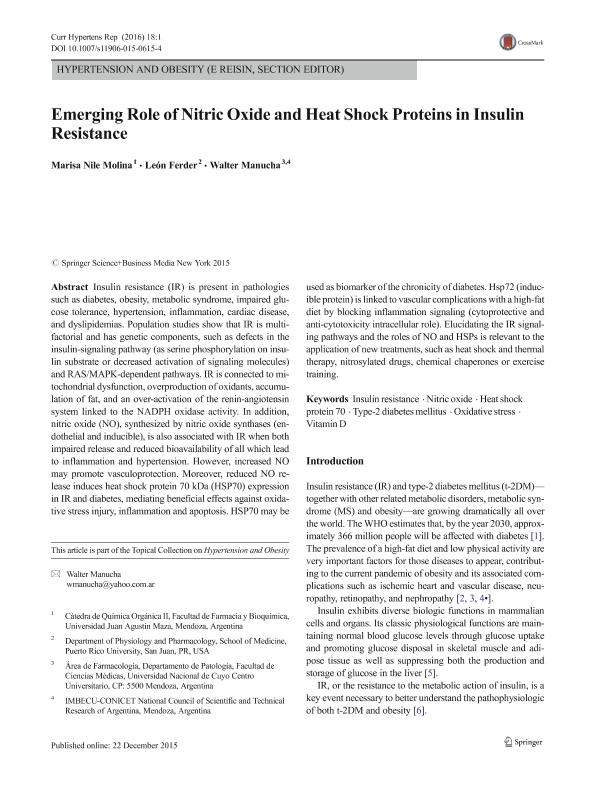Artículo
Emerging Role of Nitric Oxide and Heat Shock Proteins in Insulin Resistance
Fecha de publicación:
01/2016
Editorial:
Springer
Revista:
Current Hypertension Reports
ISSN:
1522-6417
Idioma:
Inglés
Tipo de recurso:
Artículo publicado
Clasificación temática:
Resumen
Insulin resistance (IR) is present in pathologies such as diabetes, obesity, metabolic syndrome, impaired glucose tolerance, hypertension, inflammation, cardiac disease, and dyslipidemias. Population studies show that IR is multifactorial and has genetic components, such as defects in the insulin-signaling pathway (as serine phosphorylation on insulin substrate or decreased activation of signaling molecules) and RAS/MAPK-dependent pathways. IR is connected to mitochondrial dysfunction, overproduction of oxidants, accumulation of fat, and an over-activation of the renin-angiotensin system linked to the NADPH oxidase activity. In addition, nitric oxide (NO), synthesized by nitric oxide synthases (endothelial and inducible), is also associated with IR when both impaired release and reduced bioavailability of all which lead to inflammation and hypertension. However, increased NO may promote vasculoprotection. Moreover, reduced NO release induces heat shock protein 70 kDa (HSP70) expression in IR and diabetes, mediating beneficial effects against oxidative stress injury, inflammation and apoptosis. HSP70 may be used as biomarker of the chronicity of diabetes. Hsp72 (inducible protein) is linked to vascular complications with a high-fat diet by blocking inflammation signaling (cytoprotective and anti-cytotoxicity intracellular role). Elucidating the IR signaling pathways and the roles of NO and HSPs is relevant to the application of new treatments, such as heat shock and thermal therapy, nitrosylated drugs, chemical chaperones or exercise training.
Archivos asociados
Licencia
Identificadores
Colecciones
Articulos(IMBECU)
Articulos de INST. DE MEDICINA Y BIO. EXP. DE CUYO
Articulos de INST. DE MEDICINA Y BIO. EXP. DE CUYO
Citación
Molina, Marisa Nile; Ferder, León; Manucha, Walter Ariel Fernando; Emerging Role of Nitric Oxide and Heat Shock Proteins in Insulin Resistance; Springer; Current Hypertension Reports; 18; 1; 1-2016; 1-13
Compartir
Altmétricas




